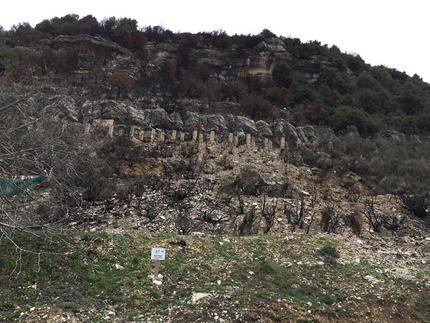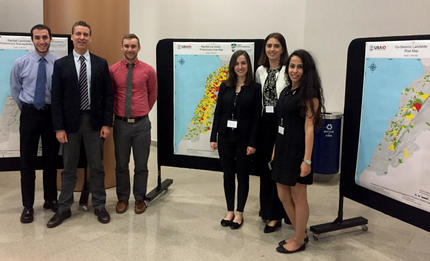New map details landslide risk across Lebanon
LAU professor Grace Abou Jaoude presents findings of her latest research during an intercollegiate workshop hosted by the School of Engineering.

This figure shows a location in Jezzine where rockfall susceptibility and risk of a road was predicted by the study. The columns, observed on site, seem to have been constructed by locals to protect from rockfall runout on the road.
A workshop on landslide risk assessment, hosted by the Department of Civil Engineering and held last week at LAU Byblos, attracted students and professors from several Lebanese universities, many of whom presented their research projects and findings.
The intercollegiate half-day workshop was organized and hosted by LAU Associate Professor Grace Abou Jaoude, whose latest research has centered on developing a map that clearly indicates the risk of landslides across all villages in Lebanon. The resulting documents, which were on display at the workshop, take into account the risk of both loss of life and infrastructure damage caused by potential rainfall and earthquake-induced landslide failures.
Among the eleven LAU students and graduates to work with Abou Jaoude on the project was Miriam Tawk. “This experience opened my horizons and showed me what research really entails,” said the alumna, who will this year be pursuing a Ph.D. in Australia. “The maps we produced are very important to Lebanon and should help both private and public sector institutions mitigate the risk of landslides. We need to be prepared. Lebanon can’t handle any more damage and failure.”
The research project, funded by USAID grant program Partnerships for Enhanced Engagement in Research (PEER), follows an earlier stage of study on the topography and geology of Lebanon. The latter was also funded by a PEER grant, which resulted in the delineation of areas prone to slides during a major earthquake.
Receiving two PEER grants back to back is rare, says Joseph Wartman, associate professor of geotechnical engineering at Seattle’s University of Washington, who collaborated with Abou Jaoude’s team in completing the research. “This project has certainly strengthened the expertise available in our field,” said Wartman, adding that the quality of the undergraduate LAU students he collaborated with was comparable to that of graduate students he has worked with elsewhere.
Wartman was among the visiting scholars to present his own research at the workshop. While he outlined the effects of a recent earthquake in New Zealand on infrastructure systems, intercollegiate research unit RUMMARE detailed case studies from Dahr el Baidar and Kfarnabrakh.
A team from AUB then presented their work on risk assessment of clayey slopes, followed by a researcher from Université Saint Joseph who spoke about geotechnical assessment of landslides in Lebanon.
Also contributing to the knowledge exchange were two academics from the University of Balamand, one of whom described seismic damage in Byblos, while the other presented research that involved mapping forest fire risks across Lebanon and developing an interactive web portal to give citizens access to real-time information.
“We are delighted to provide an opportunity for others to present and exchange knowledge,” said Abou Jaoude of the workshop. “It is for the collective benefit of all our students and researchers.”
LAU student of civil engineering Hratch Agopian agreed. “Sharing knowledge this way is great for creating benchmarks for future work, promoting unified efforts and collaborating to access more funds.”
More
Latest Stories
- LAU Athletes Bring Home Trophies from Athens and Belgrade
- From Ruins to Resources: Reimagining Lebanon’s Post-Destruction Urban Spaces
- Medical Graduates Showcase their Research Leadership
- To Dance Toward Tomorrow
- Six LAU Faculty Listed Among the World’s Top 0.05 Percent by ScholarGPS
- Lebanon’s Brightest Compete for LAU Engineering Scholarships
- This Summer: Robotics and Artificial Intelligence Summer School for Middle Schoolers
- Into the Psychology of Justice


